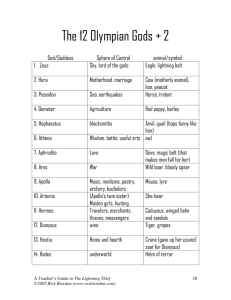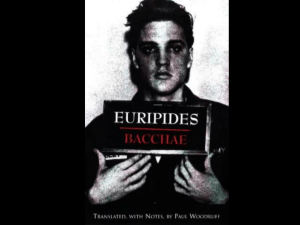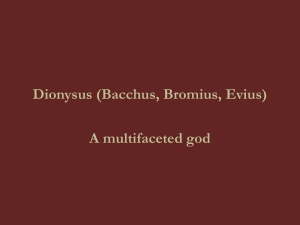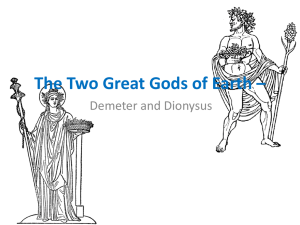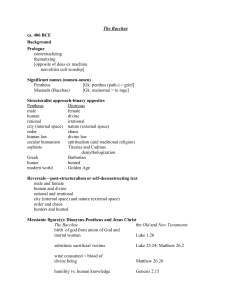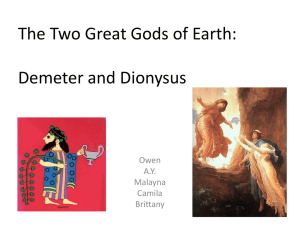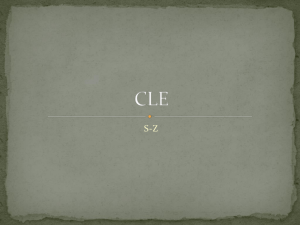Chapter Ten, Lecture One
advertisement
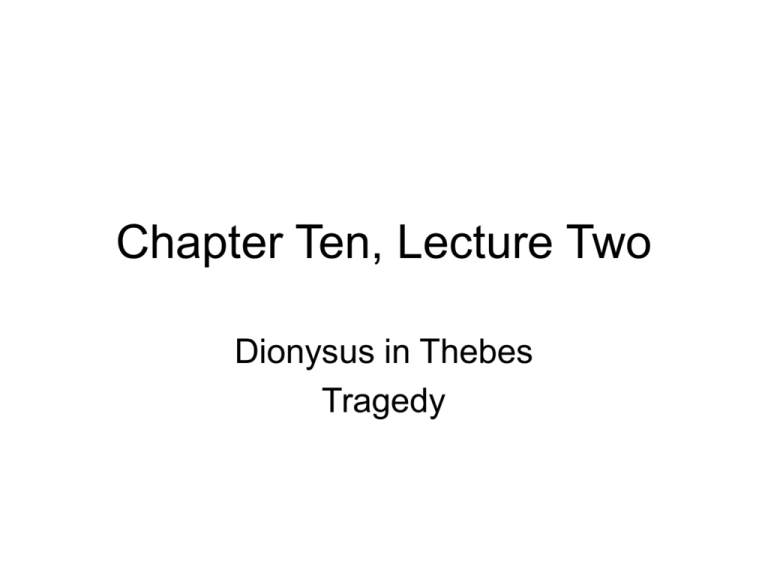
Chapter Ten, Lecture Two Dionysus in Thebes Tragedy Dionysus in Thebes • Best known story of resistance to the Dionysus told by Eurpides in his tragedy, the Bacchae • Dionysus in Thebes to spread his cult and to punish the blaspheme against his mother, Semelê, by her sisters Antonoë and Agavê Dionysus in Thebes • The women and others are already in the mountains • The king, Pentheus, will oppose the cult • Even old Tiresias and Cadmus have put on the fawn skins and are going out • Dionysus, in disguise, is brought to Pentheus by soldiers Dionysus in Thebes • Pentheus thinks that he is only a priest of Dionysus and taunts him. • Dionysus is led away; the palace is destroyed by an earthquake and Dionysus comes back • A report comes in about miracles and wonders being performed in the mountains by the Maenads Dionysus in Thebes • Pentheus is about to go out with a force to capture the women, but Dionysus casts a spell over him • Pentheus now wants to see the “orgies” for himself • Dionysus helps disguise Pentheus as a woman and leads him away Dionysus in Thebes • A messenger reports that Pentheus was killed by the Bacchantes – He was pulled down from a tree and torn to pieces – His own mother, Agavê, pulled off his head • Agavê comes on stage with the head on her thyrsus • She is shown by Cadmus what she has done Dionysus’s Journey to the Land of the Dead Journey to the Land of the Dead • Dionysus goes to the underworld to release his mother, who had died • Shown the way by a shepherd from Argos • Near the swamp of Lerna • Adorned the shepherd’s grave with a wooden phallus • The two become immortal and live in Olympus Observations: Myths of Dionysus Observations • Dio – • -nysos – son? – Nysa – Another name for Dionysus (Hence Nysai) Observations • Eastern origins not doubted • Names – Semelê < Zemelô – Thyrsus < Hittite tuwarsa (vine) ? – Dionysus = Lydian bakivali ? • Myths – From Thrace or Phrygia and Lydia Observations • A historical fact – A new cult being brought into Greece around 800 BC ? – But he’s in Homer and Linear B tablets • Etiological for viticulture ? Observations • Myths contain many folktale elements – Hasty wish – Vengeful stepmother – “portion of the kingdom” (Proetus and Melampus) – Short-sighted fool Observations • Deeper meaning begins with the fact he is god of fertility, preserved in epithets – he of the trees – god of blossoms – he of the black goatskin – followers called boukoloi (“bullherders”) – god of “wet” vegetation Observations • A dying fertility god, like Dumuzi – Perhaps originally the consort of Semelê (Zemelô) • Resistance to his cult – But even devotees can be destroyed • Always depicted as a new and foreign god – Reflects perhaps Greek aversion to violence and irrationality The Cult of Dionysus The Cult of Dionysus • Different from other cults – Olympians remote and known through their external works – Dionysus presence direct and personal The Cult of Dionysus • • • • • • “the god who comes” enthousiasmos ekstatis lysios sparagmos ômophagia The Cult of Dionysus • Cult appealed especially to women • Reflection of and reaction to their submissive social role? • Dionysus eventually tamed and give a civic role – Romans suppressed it – Christians thought Dionysus was a demon, but elements of his cult are similar to Christian practices and thinking Dionysus, God of the Theater Dionysus, God of the Theater • Tragedies performed at the Lenea – “Festival of the Maenads (those of the wine vat) • Tragedies also at the City Dionysia – Three days of tragedies – Three on each day – Each day ends with one satyr play Dionysus, God of the Theater • The relationship between theater and the cult of Dionysus is murky • Three main theories – Emerged from dithyramb (Aristotle) – Emerged from ritual performances (anthological) – Emerged from a lament for the dead hero Dionysus, God of the Theater • Perhaps a better explanation sees it as a literary invention and political need – Aristotle: Thespis first added the actor to a choral song. This is the innovation to the old form – Aeschylus added a second actor, and Sophocles the third and final Dionysus, God of the Theater • This innovation (Thespis) made around the time of Pisistratus (530 BC) • Pisistratus reorganized the old Dionysus festival and made it available to the dêmos of Athens – A citywide “drinking party” to celebrate the new order of things Dionysus, God of the Theater • Origins of comedy even more obscure – Perhaps much older • Original Dionysiac kômos given dramatic elements – plot, setting, actors – Aristophanes the major source of information about the earliest forms of comedy End

